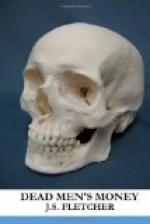As it soon appeared, Mr. Ridley knew a good deal. After a bit of preliminary questioning, making things right in the proper legal fashion as to who he was, and so on, the coroner put a plain inquiry to him. “Mr. Ridley, you have had some recent dealings with this man James Gilverthwaite, who has just been mentioned in connection with this inquiry?” he asked.
“Some dealings recently—yes,” answered the clergyman.
“Just tell us, in your own way, what they were,” said the coroner. “And, of course, when they took place.”
“Gilverthwaite,” said Mr. Ridley, “came to me, at my vicarage, about a month or five weeks ago. I had previously seen him about the church and churchyard. He told me he was interested in parish registers, and in antiquities generally, and asked if he could see our registers, offering to pay whatever fee was charged. I allowed him to look at the registers, but I soon discovered that his interest was confined to a particular period. The fact was, he wished to examine the various entries made between 1870 and 1880. That became very plain; but as he did not express his wish in so many words, I humoured him. Still, as I was with him during the whole of the time he was looking at the books, I saw what it was that he examined.”
Here Mr. Ridley paused, glancing at the coroner.
“That is really about all that I can tell,” he said. “He only came to me on that one occasion.”
“Perhaps I can get a little more out of you, Mr. Ridley,” remarked the coroner with a smile. “A question or two, now. What particular registers did this man examine? Births, deaths, marriages—which?”
“All three, between the dates I have mentioned—1870 to 1880,” replied Mr. Ridley.
“Did you think that he was searching for some particular entry?”
“I certainly did think so.”
“Did he seem to find it?” asked the coroner, with a shrewd glance.
“If he did find such an entry,” replied Mr. Ridley slowly, “he gave no sign of it; he did not copy or make a note of it, and he did not ask any copy of it from me. My impression—whatever it is worth—is that he did not find what he wanted in our registers. I am all the more convinced of that because—”
Here Mr. Ridley paused, as if uncertain whether to proceed or not; but at an encouraging nod from the coroner he went on.
“I was merely going to say—and I don’t suppose it is evidence—” he added, “that I understand this man visited several of my brother clergymen in the neighbourhood on the same errand. It was talked of at the last meeting of our rural deanery.”
“Ah!” remarked the coroner significantly. “He appears, then, to have been going round examining the parish registers—we must get more evidence of that later, for I’m convinced it has a bearing on the subject of this present inquiry. But a question or two more, Mr. Ridley. There are stipulated fees for searching the registers, I believe. Did Gilverthwaite pay them in your case?”




